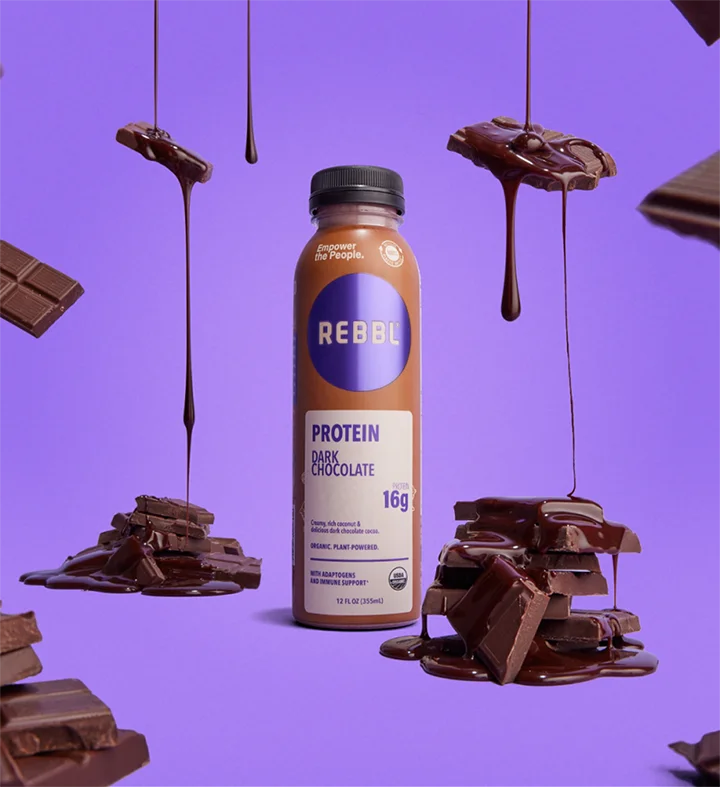

All About Plant-Based Keto
Plant-Based Keto is a thing. And it’s amazing.
By now, you’ve probably heard a lot of buzz around ‘keto’ and you might think of bacon, cheese, and more meat. But before you dismiss it as just another diet fad, consider the science around ketogenic and benefits of ‘plant-based-keto,’ which can help with weight loss, energy levels, brain health, stable blood sugar, and so much more. We recommend that you consult with your physician before you start a keto diet as you would

In this article, REBBL Collective Member and Functional Medicine Practitioner Dr. Will Cole delves into plant-based keto. First, a ketogenic diet is characterized by a high-fat, moderate protein, and low-carbohydrate ratio of macronutrients in order to shift your body from burning sugar in the form of glucose for fuel to fat in the form of ketones. Basically, your body burns off fat instead of glucose. This is known as being in a state of ‘ketosis.’ *Note, because every body is different, the amount of carbohydrate levels required to enter a state of “ketosis” can be highly individualized, but generally lowering carbohydrates to 20-50 grams per day can be a good starting point.
Why Go Keto
As a society, we’ve been taught that fat is bad and that sugar is both necessary and the most efficient way to fuel our bodies. However, that couldn’t be further from the truth. Ultimately, this reliance on sugar has put us on a path to blood sugar problems and other chronic health conditions.
The average American eats an estimated 765 grams of sugar every five days compared to the 45 grams of sugar Americans ate in 1844 over the same 5-day period. That massive 1600% increase can be attributed to our drastically different food supply. Today’s Standard American Diet (SAD) emphasizes carbohydrates that break down into sugar, plus hidden sugar in almost every packaged food on the grocery store shelves – soups, salad dressings, condiments, etc.
When you eat sugar, your body releases insulin to carry glucose around your body to areas that need it. So while some sugar can be ok, our sugar-loaded diets leave us with constantly high blood glucose levels as our bodies aren’t able to utilize all that “fuel.”
High blood sugar on its own can contribute to diabetes and other major health problems. Additionally, this excess sugar gets stored as fat around your stomach, liver, and circulating fat throughout the body known as triglycerides. Basically, relying on sugar as your main source of energy is equivalent to using dirty fuel where the burning of it leaves behind pollution to your body in the form of inflammation.
Burning fat on the other hand, is a more sustainable, longer lasting form of fuel that is better for your blood sugar, energy, brain function, and etc.
For those of you who are still concerned about eating that much fat, when looking at it from an evolutionary and biological standpoint we can see how our bodies actually thrive off of more fat. Not only is your brain comprised of 60% fat, as babies we started out our lives relying on fat in the form of breast milk for energy and development.
The Downsides to Conventional Keto
Now that we know just how beneficial keto can be, it may be tempting to stock up on all the cheese and bacon that can fit in your grocery cart. But not so fast. Most traditional ketogenic diets focus heavily on meat and dairy but oftentimes they come from conventionally processed non-organic sources of these foods which have beenlinked to health issues.”
Conventional keto diets also lack enough vegetables due to people avoiding plant foods out of fear of going over their carb limit. This fear leaves many lacking essential prebiotic fiber for a healthy gut and other nutrients needed for optimal health.
Because of this emphasis on meat and dairy, conventional ketogenic diets don’t take into consideration the many sensitivities that people can have to these food as well as leaving out those who would rather be more plant-based.
This is where my plant-based keto plan, aka Ketotarian comes in. Eating plant-based keto allows you to reap the benefits of plant nutrients and ketosis, while also avoiding the common keto pitfalls. By focusing on vegan, vegetarian, or pescatarian versions of plant-based healthy fats you can get the fat-burning of the keto diet along with the nutrient density of plants.

The Basics of Plant-Based Keto
The principles of Ketotarian are simple:
-
Eat real food.
-
Keep your carbs low.
-
Keep your healthy fats high.
-
If you eat a non-starchy vegetable, add some healthy fats.
-
If you eat a healthy fat, add some non-starchy vegetables.
-
Eat when you are hungry.
-
Eat until you are satiated, then stop.
In terms of macronutrients, the ratios are going to be the same as a conventional keto diet: high-fat, moderate protein, low-carb – you are just shifting your focus from meat and dairy to plant-based foods. In general, your meals will consist of the foods laid out in the Ketotarian triangle, with the majority of your macronutrients coming from the bottom of the pyramid and then working your way up. Ideally,60-75 percent of your calories should come from fat, 15-30 percent from protein, and 5-15 percent from carbohydrates. For vegetarian and pescatarians you can also add in cage-free eggs and wild-caught seafood.
Ready to Try Plant-Based Keto?
Support your health and wellness journey with nourishing elixirs that align with a keto lifestyle! Each elixir is soulfully crafted with super herbs like reishi for immunity, maca for stamina, and ashwagandha for vitality. These creamy coconut-milk elixirs can help nourish your body for optimal health!

